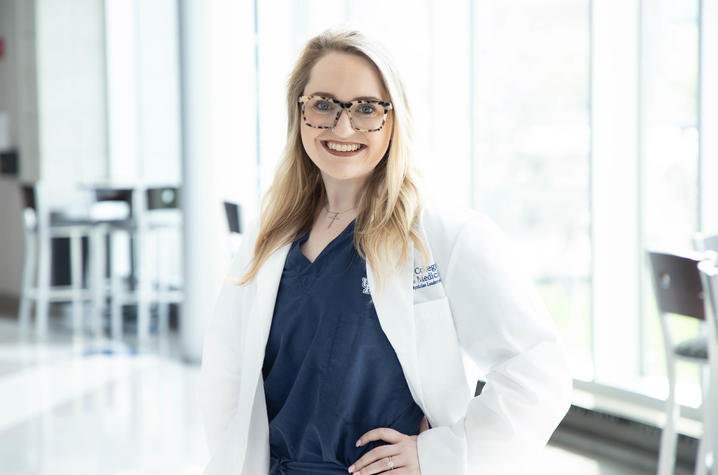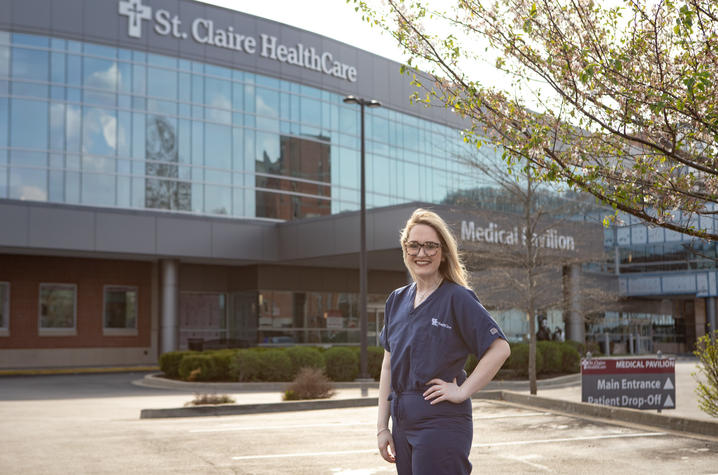First-gen Medicine grad plans to ‘pay it forward’ with career in rural medicine
LEXINGTON, Ky. (May 10, 2023) — This Saturday, the University of Kentucky College of Medicine will be graduating its largest-ever class. Across all four sites of the UK College of Medicine — Lexington, Morehead, Bowling Green, and Northern Kentucky — a record-setting class of 190 medical students are set to receive their medical degrees and begin practicing medicine.
Pike County native Shelley Stiltner is a first-generation college student and fourth-year medical student graduating from the UK College of Medicine Rural Physician Leadership Program in Morehead. Upon graduation, she will be pursuing residency in obstetrics and gynecology at the University of Tennessee Medical Center in Knoxville. She explains why a college education was so important to her, and how it will lead her to success in her future career as a physician.
Q: Why was going to college important to you?
A: I think that being the first to do anything is scary. I come from a long line of hard workers from Eastern Kentucky and southwest Virginia. From coal mining to raising children, my family fought coal dust and poverty to ensure that each generation had a better chance than the last. Not only did my family not have the money to send their children to college, but it was a terrifying thought to send your babies far away into this big world of unknowns as no one had ever done it before.
My dad was unfortunately injured in a devastating coal-mining accident at an early age. Living on disability, we struggled at times, and I began waitressing at 14 years old at a local restaurant. Though I loved working, I knew there was something else out there for me — I just had no idea how to get there. Luckily, I had many teachers and mentors along the way who guided me in the right direction. I wanted to “make it” for those in my family who never had the opportunity, but I needed a lot of guidance in getting there. After getting a full scholarship to UK, I knew that this would not only be an investment for my future but also a “thank you” to those who worked and sacrificed to help me get there.
Q: What was your biggest worry/challenge when starting college?
A: I graduated from East Ridge High School in a class of around 150 students. Imagine my surprise when I walked into my first general chemistry course on the first day of freshman year to 300 faces staring back at me. I’m surprised I didn’t walk myself back to K Lot that second and hit the Mountain Parkway back to Pike County. I worried then, and still worry now to an extent, that the stereotype of Eastern Kentucky that is often portrayed in the media will overshadow who I am as a person. I used to worry that my classmates would think I was unintelligent if I asked a question, or as silly as it sounds, would believe that I was let in by mistake. I was afraid that I wouldn’t be able to keep up in my classes and wasn’t cut out for college. I spent so much time worrying that being from Eastern Kentucky would be my weakness, but it was my strength all along.
Q: Why UK for medical school?
A: Even as a little girl, I can remember envisioning the University of Kentucky as the most perfect place. I had known of a few older kids from Elkhorn City that went to UK and were extremely successful. To me, UK seemed to be the place where possibilities were endless, and no dream was out of reach, even for kids from Elkhorn City. As I earned my degree in human nutrition at UK, I learned that the high standard of education did not stop at undergraduate studies. Aside from its prestigious academic reputation, the most persuading factor in pursuing my medical education at UK College of Medicine was its unwavering dedication to rural medicine.
My decision to join the Rural Physician Leadership Program, a UK College of Medicine program geared toward shaping the next generation of rural physicians, has been one of the most rewarding decisions of my lifetime. I have gained unmatched experience in rural health care and feel confident in my ability to take what I have learned and truly make a difference in a rural community. UK saw a grave health care need in rural Kentucky, which I call home, and developed a program to bridge the gap. For that, I am grateful.
Q: What’s your favorite memory from your time in college?
A: It is so hard to nail down a specific memory from undergrad or med school because all of them are so special to me. There are so many people that I have encountered between my time in undergrad and medical school that have truly made me a better person. One experience in particular has really stuck with me, and I feel truly emphasizes the long-lasting relationships that the University of Kentucky makes possible.
I have had the honor of mentoring Sheyanne Trent, a rising fourth-year medical student in the UK College of Medicine Rural Physician Leadership Program, for many years now. We met in undergrad when I worked as a general chemistry tutor at The Study and she was a student in CHE 105/107. After many long nights working through chemistry problems, we became close friends. She is a first-generation college student from Eastern Kentucky as well and came to UK with a humble heart and big dreams.
Shey and I were members of the same sorority in undergrad, Alpha Delta Pi, and I was so proud to welcome her to the RPLP family at UKCOM and serve alongside her on the Admissions Advisory Committee. She is intelligent, extremely driven and will be a trailblazer in rural women’s health. She encourages me to be a better person, friend and future physician. Our friendship is the perfect example of how the University of Kentucky makes it possible for rural students to reach their dreams by normalizing the fact that they CAN do it, no matter where they started. Rural students paving the way for the next generation of rural students is the unspoken initiative of the Rural Physician Leadership Program, and I am so grateful and proud to say that I will soon be a graduate of this program.
Q: What do you hope to achieve with your college degree(s)?
A: My passion lies with women’s health. Caring for a population that often puts others before themselves is a gift that I will never take for granted. Specifically, I hope to do my part in tackling the opioid epidemic by getting involved in medication-assisted treatment during pregnancy. Joining the fight against opioids and (hopefully) becoming part of the solution is a cause that is very near to my heart. Additionally, I hope to invest in the next generation of rural physicians by serving as a mentor. There is no way I’d be where I am today without the help of mentors along the way. A promise I made to each of them was that I would pay it forward, and that is a promise I plan to keep. If I can inspire at least one budding rural physician that they have what it takes to make it in medicine, I will consider my career a success.
Q: Do you have any advice for future first-generation college students?
A: My advice for future first-generation college students is to proudly be the first. It will be scary. You will want to quit and return to what is familiar. With every feeling of uncertainty, remember that there were likely many before you that only dreamed of being where you are. For those coming from unfortunate situations, please remember that it only takes one brave person to break a generational curse. When things get hard, and you feel like giving up, remind yourself who or what your purpose is in chasing this dream. There are so many of us out here that had to be first, and we must lean on one another. I know your fears because I have also feared them, but it can be done. If no one has told you today, I am so proud of you.
As the state’s flagship, land-grant institution, the University of Kentucky exists to advance the Commonwealth. We do that by preparing the next generation of leaders — placing students at the heart of everything we do — and transforming the lives of Kentuckians through education, research and creative work, service and health care. We pride ourselves on being a catalyst for breakthroughs and a force for healing, a place where ingenuity unfolds. It's all made possible by our people — visionaries, disruptors and pioneers — who make up 200 academic programs, a $476.5 million research and development enterprise and a world-class medical center, all on one campus.







